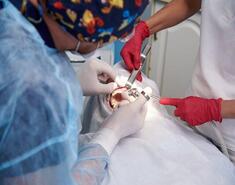Surgical dentistry is a practice that performs the work of tooth preservation surgeries, bone grafting, tooth implants, tooth removal, and more. In cases where specific surgical treatments or tooth extraction cannot work, the surgeon will remove the diseased tooth without pain. This is commonly performed with wisdom teeth.
Professional surgeons are experienced and can perform safe surgeries while effectively dealing with these common problems. It is not just about removing teeth. The surgeons can also advise about dental implants and tooth replacements after surgeries and extractions.

Helpful Importance Of Surgical Dentistry
Dental surgeries are recommended when other procedures or treatments are ineffective. They are performed in extreme pain and severe tooth and mouth conditions. Some procedures, like wisdom teeth removal, can be complicated, as these teeth grow inaccurately across gums or get trapped in the jaw and gum tissue.
In cases like these, surgery is inevitable. Sometimes, swelling or infection can worsen, and tooth removal is required. In some other cases, a cyst or tumor may need to be removed. In these situations, surgery is the only viable option.
There are several benefits of surgical dentistry, including improved self-esteem. Here are some other significant benefits of surgical dentistry:
- Replacing a Tooth Permanently
Replacing a missing tooth with a proper dental implant is a reliable and permanent treatment with a 98% success rate. An older solution of adding a bridge or denture can replace the upper portion of the tooth, but it will not work at the root. For a strong root replacement, Surgical Dentistry is very important. This can eliminate the need for future procedures.
- Preventing Complex and Permanent Damage
Oral health problems often worsen with time, so it is essential to treat them quickly. Innovative and advanced technologies like bone grafting can more effectively treat problems in the mouth, gums, and jaws. As a result, there is a high success rate with technological advances in oral health and more options for the patient than in previous years. Overall, it can prevent painful and expensive damage to the teeth and mouth.
- Prevents Tooth Loss
Tooth implants are usually the last option. Everyone wants to eliminate problems with their teeth to preserve their original ones, if possible—the advanced procedures in surgical dentistry help prevent losing existing teeth.
- Rapid Treatment
Before, conventional oral procedures were time-consuming. But with the development in dental technology, the speed and quality of dental surgeries have improved immensely, allowing for comparatively rapid treatments and relief.
- Satisfaction
The success rate and effectiveness of surgeries have increased with time. Nowadays, these surgeries tend to involve fewer steps and much less pain. With less discomfort and hassle, patient satisfaction is greatly improved.
- Deal With Other Hidden Issues
Many hidden tooth problems might go unnoticed daily and continue to worsen. Surgical dentistry can help in recognizing these issues and allow for earlier treatment. Dentists may even be able to identify physical or mental ailments that may seem unrelated to the teeth and mouth but that tends to affect oral health.
Know The Superior Types Of Surgical Dentistry:
The word “surgery” can be very anxiety-provoking for some patients. People usually consider surgery problematic, painful, and expensive. But these days, those ideas are mere misconceptions. Every type of case is different, which means the treatment and healing needs are different as well.
With advancements in technology, there are various pocket-friendly options and painless treatments. A dental surgeon is experienced and knowledgeable in this context. They prescribe the most appropriate treatments for each individual patient. There are numerous kinds of surgical procedures based on different oral problems:
- Wisdom Teeth Removal
Everyone is born with wisdom teeth. They tend to erupt between the ages of 18-25. Usually, they don’t cause pain. But if they can’t grow in the available space in the mouth, it results in dental pain and other oral problems. A dental surgeon performs wisdom tooth extraction, and a patient requires a few days for complete recovery. Anesthesia is used in the surrounding area so that the procedure is painless, but there may be some healing pain after the procedure.
- Dental Implants Surgery:
When you lose an original tooth, it’s a dental implant that can restore your smile. You can often face slurred speech and struggle to chew normally if you lose teeth. But dental implants function like regular teeth in addition to boosting your confidence. They serve as alternative teeth so you can look and feel like your usual self. Dental Implant Procedures are very common. They may take a bit longer than other surgeries, but they are necessary to ensure proper attachment to the bone and avoid future troubles.
- Cosmetic Dental Surgery:
Cosmetic oral surgery is not a necessity but a choice. People often desire to have the perfect smile or jawline to enhance their overall appearance. Models and actors usually opt for veneers to have that picture-perfect smile. It can be done by a dentist very easily and is painless.
What Are Other Promising Aspects Of Surgical Dentistry?
Surgical dentistry is associated with orthodontics, implants, and aesthetic surgery. This is why dental surgeons collaborate with other experts and specialists. Dental surgery can help with the following:
- Recognizing other diseases during procedures
- Partial or entire teeth extractions
- Dental implants
- Cosmetic or plastic surgery for the jaw
- Treating issues associated with salivary glands
- Preserving teeth
- Treating oral tumors
Advancements in technology have increased people’s ability to treat and restore their smiles. In a world of high beauty standards and social media scrolling, there is significant pressure to look good at all times.
You can get rid of your pain and simultaneously make your smile beautiful. Contact our Feasterville Dentist to schedule an appointment with our dental office.
